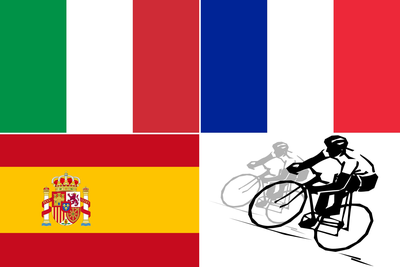 Mention the phrase ‘Triple Crown’ to most people and their minds will immediately turn to horse racing. Perhaps only people with more than just a passing interesting in cycling will even know that the sport boasts a Triple Crown, which is usually made up of the Giro d’Italia, the Tour de France and the UCI World Road Race Championship. Unsurprisingly, many consider winning all three in the same season to be the greatest achievement that a cyclist can pull off.
Mention the phrase ‘Triple Crown’ to most people and their minds will immediately turn to horse racing. Perhaps only people with more than just a passing interesting in cycling will even know that the sport boasts a Triple Crown, which is usually made up of the Giro d’Italia, the Tour de France and the UCI World Road Race Championship. Unsurprisingly, many consider winning all three in the same season to be the greatest achievement that a cyclist can pull off.
In more recent years, the Giro d’Italia has been interchanged with the Vuelta a España. This is thanks to the Vuelta gaining a sense of prestige that it has lacked in previous years. In order to win them all, a cyclist has to be excellent as a general classification rider, as well as classics rider.
In spite of the fact that it is so well-respected in the world of cycling, the Triple Crown of Cycling is not actually an official title. Not only that, but riders that achieve it don’t win any prize or trophy.
Who Has Won Cycling’s Triple Crown?
To date there has been only two winners of the Triple Crown in Cycling. Belgian Eddy Merckx won the Triple Crown of the Tour de France, Giro d’Italia and the UCI World Championship in 1974. Ireland’s Stephen Roche was just the second rider to win these three events in the same season in 1987.
No rider has won all three Grand Tours of the Tour de France, Giro d’Italia and Vuelta a España in the same season
What is Cycling’s Triple Crown?
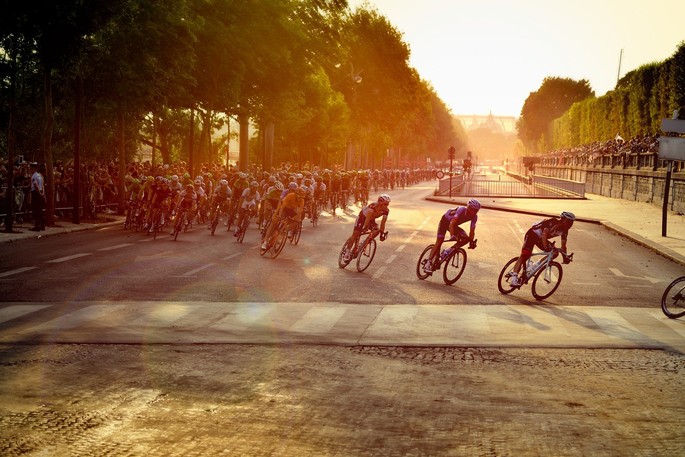
For most cyclists, winning just one of the Grand Tours would be the achievement of a lifetime. The idea of winning three in the same calendar year is fantasy for the vast majority of people who climb on a bike and ride competitively.
Tour de France
Even the majority of non-cyclists will have heard of the Tour de France, which is based in France and takes place over 21 stages. It takes 23 days to complete, with the first version of the race organised in 1903 as a well of helping sales for a newspaper called ‘l’auto’.
A UCI World Tour event, the majority of teams that takes place are UCI WorldTeams, with the main exceptions being those that are invited to take part in the race by the organisers. It is considered to be ‘the world’s biggest annual sporting event’ on account of the number of people that take part in it. It mostly takes place in July, with the route changing on a yearly basis. The nature of the race remains the same, including the use of time trials and climbing stages.
Giro d’Italia
The Giro d’Italia is essentially the Italian equivalent of the Tour de France. Much like the Tour, it traditionally takes place in one country but can sometimes take in other countries during the journey. Another similarity that it bears to the Tour is the fact that it was started in order to boost the circulation of a newspaper, this time being the Gazzetta dello Sport. First taking place in 1909, it is held in May and sometimes creeps into the start of June, lasting for 23 or 24 days.
Vuelta a España
The least prestigious of the annual multi-stage cycling events is the Vuelta a España, which didn’t begin until 1955. For that reason, it was not commonly thought of as being a possible race to consider when discussing the Triple Crown of Cycling. This has changed in more recent years, largely thanks to changes in format that have made it a more serious race than it used to be. It follows the others in being a 21-stage event that takes place over 23 days, predominantly taking place in Spain.
UCI Road World Championships
One thing that is widely agreed upon by all in the world of cycling is the fact that an achievement cannot be considered to be a Triple Crown unless it contains both the Tour de France and the UCI Road World Championships. This is in spite of the fact that most people that aren’t big cycling fans don’t know much about the UCI Road World Championships. Organised by the Union Cycliste Internationale, it took place for the first time in 1921 and is typically the last major cycling event of the year.
Winners of Cycling’s Triple Crown
At the time of writing, there are just two cyclists that have won the Triple Crown of Cycling. If that doesn’t give you a clear indication of just how difficult it is as an achievement then it’s difficult to tell what will. That limit of two is the case regardless of whether you consider the narrower definition of it requiring wins in the Giro d’Italia, the Tour de France and the UCI Road World Championships or your broaden it out to include the Vuelta a España.
Eddy Merckx (1974)
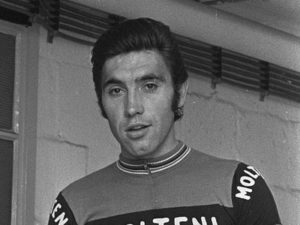
Nationaal Archief (cropped), via Wikimedia Commons
Any conversation about cycling achievements will eventually come round to mention the name of Eddy Merckx, such is the extent to which he’s had a major influence over the sport. Édouard Louis Joseph Merckx, to give him his full name, was born in Belgium on the 17th of June 1945. A hyperactive child that was always busy playing outside, Merckx was extremely competitive and played football, table tennis and basketball, as well as taking part in boxing matches to the extent he won local tournaments.
He claimed that he knew he wanted to be a cyclist from the age of four, an age he said he remembered having a crash on his bike. He rode to school and back from the age of eight, taking part in his first competitive cycle race in 1961 as a 16-year-old. He came sixth, but very much got the cycling bug and won his first race later in the same year. His school grades began to decline as he concentrated on his cycling, being selected for the men’s road race team for the 1964 Summer Olympics.
In the years that followed, Merckx’s ability on a bike improved exponentially. He ended his time as an amateur with 80 wins under his belt, turning professional on the 29th of April in 1965. Even so, it took him several years to get a Grand Tour victory under his belt, which he achieved when he won the Giro d’Italia in 1968. Not only did he win the race, he also won the points classification and the mountains classification, truly launching his name into the cycling world’s consciousness.
By the time he eventually won the Triple Crown of Cycling, Merckx had already won the UCI Road World Championships, the Tour de France and the Giro d’Italia several times each. Even so, it was an incredible achievement to get all of the races under his belt in the same year. That he also won the Belgian National Championships, the Tour de Suisse, the Critérium des As, the Escalada a Montjuïc and the Super Prestige Pernod International in the same year shows that he was untouchable at the time.
Stephen Roche (1987)
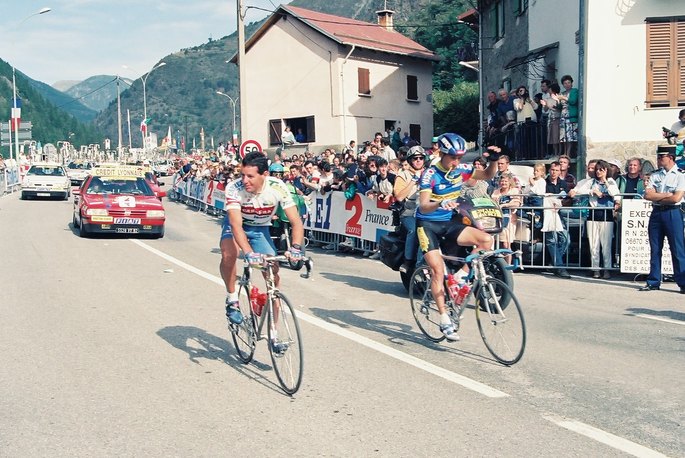
By ta_do, flickr
Born in the County Dublin area of Ireland in 1959, Stephen Roche served an apprenticeship as a machinist in a Dublin dairy before joining the Athletic Club de Boulogne-Billancourt in Paris. That was in order to help him prepare for the 1980 Summer Olympics, which were being hosted in Moscow. His performances in France earned him a contract with the Peugeot professional cycling team, meaning that he was able to leave his amateur days behind him and become a professional cyclist.
His first win as a professional came in the Tour of Corsica, then a month later he made history when he became the first new professional cyclist to win the Paris-Nice. His debut year brought him ten wins, announcing to the world of cycling that he was very much ready to make an impact on the sport. His performances in the Tour de France gradually improved, including a third-place finish in 1985. His 1986 season was something of a disaster, thanks to a knee injury sustained at a six-day event.
To suggest he bounced back from this setback would be something of an understatement. His 1987 season began with a win in the Volta a la Comunitat Valenciana, following that up with a third victory in the Tour de Romandie. He came second in the Liège–Bastogne–Liège, which was the closest he ever came to winning one of the so-called Monument Classics. He managed to get three stage wins on the board on his way to winning the Giro d’Italia, becoming the first to win it from outside of mainland Europe.
Despite his exhaustion at the end of the Giro, he was installed as the favourite in the Tour de France and didn’t disappoint. At one point during the Tour, he collapsed after an attack, losing consciousness and had to be given oxygen. When he won, he became just the fifth person to win the Giro and the Tour in the same year. In spite of the fact that he arrived to take part in the World Race Championship out of form, he still won and became just the second person in cycling to claim the Triple Crown of the sport.
Near Misses
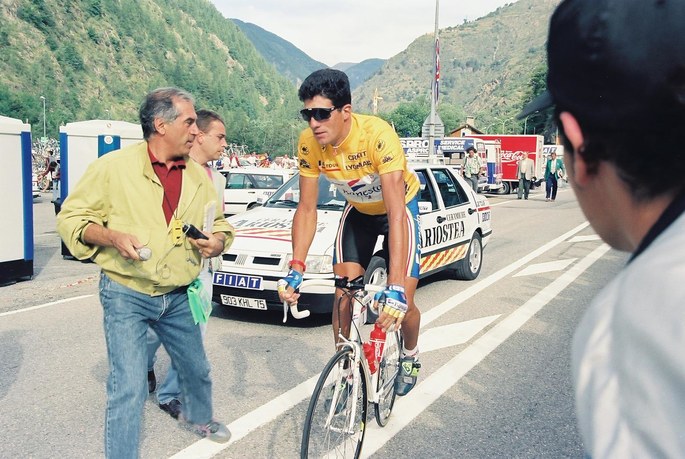
Miguel Indurain by ta_do, flickr
Whilst only two cyclists have won the Triple Crown in the sport at the time of writing, there have been a few people that have come close. Indeed, for many cyclists it has always been the World Race Championship that has escaped them, either because they did not enter, did not finish or were unable to get over the line in first place. Miguel Indurain is perhaps the one that can feel the hardest done to on the front, winning the Tour and the Giro in 1993 but coming second in the World Championship.
Here’s a look at the cyclists that have come the closest over the years, including how they did in the World Championship as well as the Grand Tours that they did win:
Same Season Winners of Two Cycling Triple Crown Legs
| Year | Name | Giro | Tour de France | Vuelta | World Championship |
|---|---|---|---|---|---|
| Chris Froome | 2017 | ✖ | ✅ | ✅ | ✖ |
| Alberto Contador | 2008 | ✅ | ✖ | ✅ | ✖ |
| Marco Pantani | 1998 | ✅ | ✅ | ✖ | ✖ |
| Miguel Indurain | 1993 | ✅ | ✅ | ✖ | ✖ |
| Miguel Indurain | 1992 | ✅ | ✅ | ✖ | ✖ |
| Greg LeMond | 1989 | ✖ | ✅ | ✖ | ✅ |
| Bernard Hinault | 1985 | ✅ | ✅ | ✖ | ✖ |
| Bernard Hinault | 1982 | ✅ | ✅ | ✖ | ✖ |
| Giovanni Battaglin | 1981 | ✅ | ✖ | ✅ | ✖ |
| Bernard Hinault | 1980 | ✅ | ✖ | ✖ | ✅ |
| Bernard Hinault | 1978 | ✖ | ✅ | ✅ | ✖ |
| Eddy Merckx | 1973 | ✅ | ✖ | ✅ | ✖ |
| Eddy Merckx | 1972 | ✅ | ✅ | ✖ | ✖ |
| Eddy Merckx | 1971 | ✖ | ✅ | ✖ | ✅ |
| Eddy Merckx | 1970 | ✅ | ✅ | ✖ | ✖ |
| Jacques Anquetil | 1964 | ✅ | ✅ | ✖ | ✖ |
| Jacques Anquetil | 1963 | ✖ | ✅ | ✅ | ✖ |
| Ercole Baldini | 1958 | ✅ | ✖ | ✖ | ✅ |
| Louison Bobet | 1954 | ✖ | ✅ | ✖ | ✅ |
| Fausto Coppi | 1953 | ✅ | ✖ | ✖ | ✅ |
| Fausto Coppi | 1952 | ✅ | ✅ | ✖ | ✖ |
| Fausto Coppi | 1949 | ✅ | ✅ | ✖ | ✖ |
| Georges Speicher | 1933 | ✖ | ✅ | ✖ | ✅ |
| Alfredo Binda | 1927 | ✅ | ✖ | ✖ | ✅ |
You can see just how impressive Eddy Merckx was as a cyclist. Not only did he achieve the honour of winning the Triple Crown of Cycling, he also came close to repeating the trick on four other occasions. Only Bernard Hinault is also on the list four times and he didn’t actually complete the Triple Crown. That being said, one of Merckx’s near misses included a win in the Vuelta a España rather than the Tour de France, which was also the case for Alberto Contador, with many people believing this doesn’t reach the requirements for being a Triple Crown of Cycling regardless.
